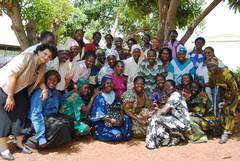Sudanese youth and women identify challenges in a war-torn country

Women participating in the 31 March - 2 April conference and seminars in Juba, Southern Sudan. Photo: Juan Michel/WCC
Based on a candid assessment of how two decades of war have affected them, Sudanese youth told church leaders what they need most: skills training, jobs and means of participating in shaping their country's future. Sudanese women, in turn, spoke out about their vulnerability, increased by war and cultural patterns.
In Sudan, youth have been treated "as passive objects rather than participants in shaping the society", affirmed a statement by some 30 Sudanese young Christians gathered in Juba, capital of Southern Sudan, for a three-day conference of church leaders, women and youth. The conference concluded an international ecumenical solidarity visit to the country that took place from 26 March to 2 April.
While the Sudanese young Christians believe that youth have a "crucial role" in "conflict resolution, peace building and sustainable development", reality shows that many are "hijacked by politicians who want to achieve their goals through wars and bloody conflicts", making of them "victims and perpetrators of violence".
The culture of war, high levels of illiteracy and poverty, lack of job and training opportunities as well as tribalism and vulnerability to HIV and AIDS are among the challenges faced by Sudanese youth.
For youth to participate in nation building, they need educational centres where they may acquire "technical and educational skills" as well as capacities in regard to "HIV/AIDS, conflict transformation, human rights and democracy". Creating job opportunities for youth "should be a priority for the church and the government".
Churches have a specific role in enabling youth to contribute to implementing the 2005 Comprehensive Peace Agreement, as well as fostering healing and reconciliation. They also have to advocate for the rights of people living with HIV and AIDS.
Women's resources and experiences
The cost of the 21-year war between northern and southern Sudan has been high for women too, according to a report by some 30 women elaborated at the Juba conference.
That cost includes scattered families, gender-based violence, an increase in the number of widows with consequences of vulnerability to "dispossession of property and wife inheritance", forced marriages and increased polygamy. HIV and AIDS caused further stigmatization of women.
Among other proposals, the report submitted to the Sudanese church leaders recommends the promotion of "women's rights through gender awareness campaigns and training", to "break the silence around issues of sexuality, HIV and AIDS", to "invest in adult education for both women and men" and to "encourage Christian men (fathers) to be involved in the life of their families".
The church should "stop applying double-standard measures regarding moral issues and expectations especially when it comes to women and men", the women affirmed.
"Reconciliation, forgiveness and healing programmes" should continue to be highly ranked among churches' priorities, the women's report proposes, and churches should involve women in their implementation so as to take advantage of their resources and experiences.
Organized by the All Africa Conference of Churches (AACC) and the World Council of Churches (WCC), the international ecumenical solidarity visit was hosted by the Sudan Council of Churches (SCC). Led by the WCC general secretary Rev. Dr Samuel Kobia, four teams of church representatives visited Khartoum, Yambio, Rumbek and Darfur.
Full report of the Juba youth workshop (pdf, 59 Kb)
Full report of the Juba women's seminar (pdf, 22 Kb)
Additional information on the visit and high resolution photos



